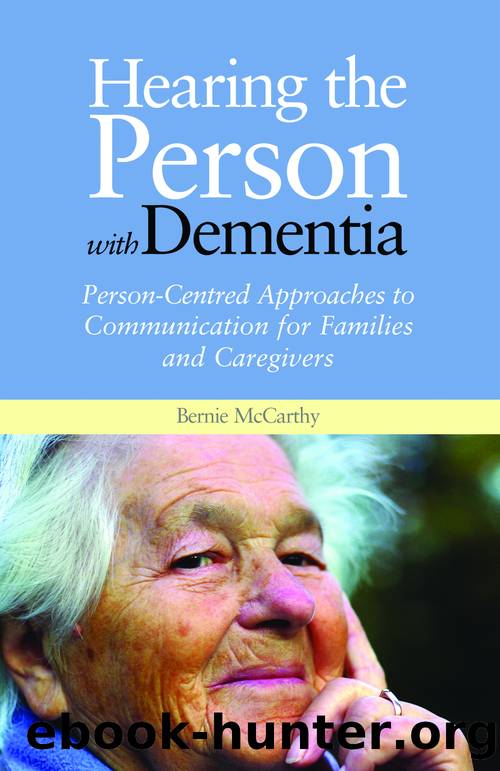Hearing the Person with Dementia by Bernie McCarthy

Author:Bernie McCarthy [Bernie McCarthy]
Language: eng
Format: epub
ISBN: 9780857004994
Publisher: Jessica Kingsley Publishers
Published: 2013-06-15T00:00:00+00:00
Chapter 3
How Do We Actually Communicate?
Communicating consists of listening and speaking. It also comprises emotions, perceptions and the many nonverbal aspects of interacting that help us understand each other and get our own message across to others.
Empathy, imagination and defensiveness
Before we consider the verbal and nonverbal components of communication it is important to consider empathy, imagination and defensiveness.
Empathy is simply defined as the capacity to understand another personâs experience. It is a building block of communication. Without it there is no understanding, no common or shared perception of the situation. Empathy requires you to leave your own perspective temporarily and use your imagination to see and feel what it is like from the other personâs point of view. Empathy and imagination go hand in hand. You need imagination to have empathy, to imagine life from someone elseâs frame of reference. What is it like to have dementia â to misunderstand, to make mistakes in conversation that you have not made before? What is it like to forget things you know you should know? Not to be able to solve a problem that you know is simple, but you just canât do it today? Not to be able to dress yourself, because you canât remember the order of clothing? To become confused about what is going on? To lose track of a conversation and feel like you donât belong any more? What is it like to feel frightened because of this? Lonely? Isolated? Angry? Sad?
To communicate well with another person whose brain is changing, and not functioning the way it used to, requires imagination and empathy. To do it well you must bring your own feelings into the room as well. This may mean feeling things you might not be comfortable feeling. You might also be thinking things about the person that make you uncomfortable, such as âI just wish they would go away.â Many caregivers think they must be unemotional or only feel good about their caring. This, however, leaves them at risk of being unable to empathise or understand the point of view and experience of the person they are caring for. To care in a person-centred way means bringing your whole self into the relationship, positive and negative feelings and all. Bring your emotions into the room.
Of course you must maintain your boundaries and remember that you have your own perspective, which is different from that of the person with dementia. But it is necessary to have a healthy engagement of your emotions in the person-centred way of caregiving.
We use empathy and imagination to communicate as we try to understand the experience of the other party. This is true at an international level when governments negotiate agreements such as trade deals. What is the other person/group saying and what do they mean? What are their interests and motivations and how do we feel and think about this? What does it mean for me/my people? When there is understanding of what is driving each party and what is important to them, then there can be agreement and a way forward.
Download
This site does not store any files on its server. We only index and link to content provided by other sites. Please contact the content providers to delete copyright contents if any and email us, we'll remove relevant links or contents immediately.
Periodization Training for Sports by Tudor Bompa(8257)
Why We Sleep: Unlocking the Power of Sleep and Dreams by Matthew Walker(6707)
Paper Towns by Green John(5181)
The Immortal Life of Henrietta Lacks by Rebecca Skloot(4581)
The Sports Rules Book by Human Kinetics(4379)
Dynamic Alignment Through Imagery by Eric Franklin(4209)
ACSM's Complete Guide to Fitness & Health by ACSM(4058)
Kaplan MCAT Organic Chemistry Review: Created for MCAT 2015 (Kaplan Test Prep) by Kaplan(4009)
Introduction to Kinesiology by Shirl J. Hoffman(3766)
Livewired by David Eagleman(3765)
The Death of the Heart by Elizabeth Bowen(3611)
The River of Consciousness by Oliver Sacks(3599)
Alchemy and Alchemists by C. J. S. Thompson(3516)
Bad Pharma by Ben Goldacre(3422)
Descartes' Error by Antonio Damasio(3272)
The Emperor of All Maladies: A Biography of Cancer by Siddhartha Mukherjee(3155)
The Gene: An Intimate History by Siddhartha Mukherjee(3095)
The Fate of Rome: Climate, Disease, and the End of an Empire (The Princeton History of the Ancient World) by Kyle Harper(3061)
Kaplan MCAT Behavioral Sciences Review: Created for MCAT 2015 (Kaplan Test Prep) by Kaplan(2985)
